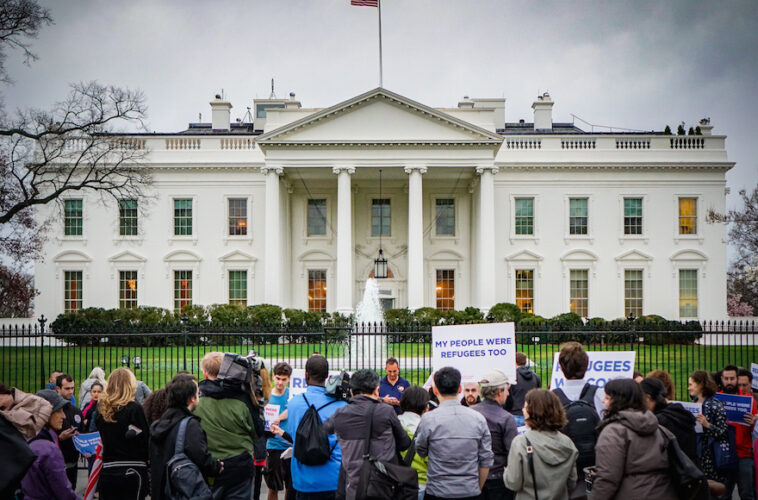President Trump Says He Won’t allow California Schools to incorporate a curriculum based on the controversial New York Times 1619 Project which is The Pulitzer-Prize winning collection reframes American history around the date of August 1619, when the first slave ship arrived on America’s shores” and will punish schools that teach “The New York Times 1619” project by withholding federal funds. President threatened to take away federal funding if they attended.
In a Sunday morning tweet, President Trump fired another shot in the culture wars, by retweeting the statement: “California has implemented the 1619 project into the public schools. Soon you won’t recognize America,”. Trump said that the Department of Education was investigating allegations that California was incorporating the 1619 Project into its lessons. and added to his tweet, “The Department of Education is looking at this. If so, they will not be funded.”
The 1619 Project is a Pulitzer Prize-winning series of articles by the New York Times Magazine that argues that 1619, which series makes some dubious claims, including that the American Revolution was fought to preserve slavery. The date the first slave ship arrived in the American colonies, is the true date of America’s founding rather than 1776. The Times 1619 project won a Pulitzer Prize for commentary, and the Pulitzer Center has since developed a package that allows schools to teach the project’s lessons. As a summary of New York Times Magazine, It says, this country was founded on the idea of slavery, not liberty. By writing the introduction, Times’ Director of the project, Nikole Hannah-Jones sys Our democracy’s ideals were false when they were written. Black Americans have fought to make them true.” “The Department of Education is looking at this and continually monitoring, they will not be funded if they do so, ” the President wrote on Twitter, citing a message from an unverified account saying it was being taught in schools there. The message came after the President on Friday night banned federal agencies from conducting racial sensitivity training related to “white privilege” and “critical race theory.”
What is New York Times 1619 Project??
The 1619 Project, inaugurated with a special issue of The New York Times Magazine, challenges us to reframe U.S. history by marking the year when the first enslaved Africans arrived on Virginia soil as our nation’s foundational date. The 1619 Project is an ongoing project developed by The New York Times Magazine in 2019 which “aims to reframe the country’s history by placing the consequences of slavery and the contributions of black Americans at the very center of US national narrative, When the new york times magazine published its 1619 Project in August, people lined up on the street in New York City to get copies.
The 1619 Project, a special issue of The New York Times Magazine, marks the 400th anniversary of the arrival of the first enslaved Africans to Jamestown, Virginia with a series of essays, images, stories, and poems that challenge readers to reframe their understanding of U.S. history by considering 1619 as the start of this nation’s story. Since then, the project is a historical analysis of how slavery shaped American political, social, and economic institutions which have spawned a podcast, a high-school curriculum, and an upcoming book. For Nikole Hannah-Jones, the reporter who conceived of the project, the response has been deeply gratifying.
It is an interactive project directed by Nikole Hannah-Jones, a reporter for The New York Times, with contributions by the newspaper’s writers, including essays on the history of different aspects of contemporary American life which the authors believe have “roots in slavery and its aftermath.” U.S. history is often taught and popularly understood through the eyes of its great men, who are seen as either heroic or tragic figures in a global struggle for human freedom. The project has sparked criticism and debate among prominent historians and political commentators.
The 1619 Project, named for the date of the first arrival of Africans on American soil, sought to place “the consequences of slavery and the contributions of black Americans at the very center of our national narrative.” Viewed from the perspective of those historically denied the rights enumerated in America’s founding documents, the story of the country’s great men necessarily looks very different. It also includes poems, short fiction, and a photo essay. Originally conceived as a special issue for August 20, 2019, it was soon turned into a full-fledged project, including a special broadsheet section in the newspaper, live events, and a multi-episode podcast series.
To give the answer for requested factual corrections by historians Gordon S. Wood, James M. McPherson, Sean Wilentz, Victoria Bynum, and James Oakes expressed with accusing the project of putting ideology before historical understanding, Jake Silverstein, the editor of The New York Times Magazine, defended the accuracy of the 1619 Project and declined to issue corrections.

